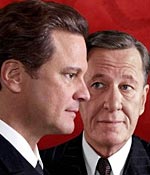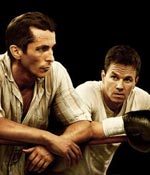 | « Back to article | Print this article |
 With The King's Speech winning four major Oscars, the question is how the film, which defeated the heavy contender The Social Network, will further benefit from the honours and publicity.
With The King's Speech winning four major Oscars, the question is how the film, which defeated the heavy contender The Social Network, will further benefit from the honours and publicity.
The historical has already grossed a strong $260 million worldwide making it one of the most profitable surprise hits in recent years. The movie, which began its Oscar journey with strong reviews and audience support at the Toronto International Film Festival last September, won the Oscar for Best Picture, Best Director (Tom Hooper), Best Original Screenplay (David Seidler) and Best Actor (Colin Firth).
Hollywood insiders expect it to gain most at the box office post-Oscars.
Weinstein Co, led by the legendary marketing genius Harvey Weinstein, who along with brother Bob had won many Oscars for films like Shakespeare in Love when they ran Miramax, is planning to give The King's Speech a new release.
The Wall Street Journal reported soon after the Oscar ceremony that the Weinsteins planning to roll out a 'family friendly' version with deleting some of its colourful language.
Many movie fans and bloggers have been calling the attempt a movie sacrilege. But the Weinsteins believe they are on the right track.
The most affected scene would involve Colin Firth's character, King George VI being encouraged by his speech therapist Lionel Logue (Geoffrey Rush) to curse many times during a speech therapy session. The new king wants to get rid of his stutter urgently for he has to address Britain and its colonies on radio to stand up to Hitler's aggression plans on the eve of World War II. If the speech is not rousing, the morale of the empire would remain low.
The movie's biggest appeal lies not so much in history but in a man fighting the odds. It is also a stirring story of unexpected friendship emerging in an unlikely situation.
Trade publications revealed that The Motion Picture Association of America approved the change the Weinsteins sought and waived a rule requiring distributors to withdraw the original version of a film for 90 days before a new version is shown. The film could then have several DVD and Blu-ray versions including a Director's Cut perhaps with a few scenes that were edited out.
Tariq Anwar, the Oscar nominated editor of the film, revealed last week that a scene he thought was brilliant was cut because of the fear it might provoke unwanted controversy.
'A scene showing King George V's dying moments was long debated,' the veteran editor said a week before the Oscars.
It pictured the king being given cocaine and morphine to hasten his death in order that the announcement could be made in the following morning's papers, he said. 'Derek Jacobi was out of this world in that scene,' he revealed, adding it was cut because 'there was a concern it would be controversial and people would fixate on it.'
After he accepted his Oscar, scriptwriter David Seidler had joked that his father used to say he was a late bloomer.
The 73-year-old writer added: 'I believe I'm the oldest person to win this award.'
Journalists, who have followed the film's journey from Telluride to Toronto film festivals and then at various press junkets, have known an inspiring fact about Seidler that millions across the world are now reading about.
A week before the Oscars, he had been telling the media especially the Belfast Telegraph that he was terrified at the prospect of giving a speech, even a two-minute Oscar acceptance speech. 'I could easily blubber because it's been such a long journey, and it's such a meaningful one to me, such a personal journey,' he had said.
Seidler suffered from a stammer in his childhood. He said listening to George VI's speeches on the radio during and after the World War II and that inspired him to fight his own stammer.
He also revealed that many years ago he met a son of the real speech therapist, who told him that he had some of his father's papers he could show the writer. But he also said Seidler should check with the Queen Mother before proceeding. She asked Seidler not to write the film in her lifetime, as 'the memories of these events are still too painful'. She died in 2002 nearly 50 years after the death of her husband.
 The other winner of the Oscar night, The Fighter, will also get a boost at the box office. The film is already a hit, and now thanks to the two wins in the supporting category for Christian Bale and Melissa Leo, it will flex its muscles more. It has pocketed over $130 million worldwide and can easily surpass $200 million.
The other winner of the Oscar night, The Fighter, will also get a boost at the box office. The film is already a hit, and now thanks to the two wins in the supporting category for Christian Bale and Melissa Leo, it will flex its muscles more. It has pocketed over $130 million worldwide and can easily surpass $200 million.
The ballet thriller Black Swan, a bigger hit than The Fighter, will blossom in many foreign territories. The film earned Natalie Portman her first Oscar for Best Actress. It is nearing its American run; worldwide, the film has grossed about $220 million, and could easily reach $300 million.
Each of these three films are small-budget movies by Hollywood standards. The King's Speech was made for about $15 million, Black Swan cost about $13 million and The Fighter cost $23 million. All three films beccme profitable when the Oscar nominations were announced in January.
Toy Story 3, already a gigantic hit with over $1 billion in worldwide box office gross, could benefit considerably in DVD/Blu-ray rentals and sales. The Pixar-Disney film, which won the Best Animated Film Oscar, has grossed over $500,000 worldwide in ancillary home entertainment sales.
The Social Network took the Oscars for Best Music, Editing and Adapted Screenplay, and may benefit for its Oscar attention. The film, which has earned some $220 million worldwide, has been quite a success in the home entertainment segment in North America for nearly a month. Its sales could go up in the coming weeks.